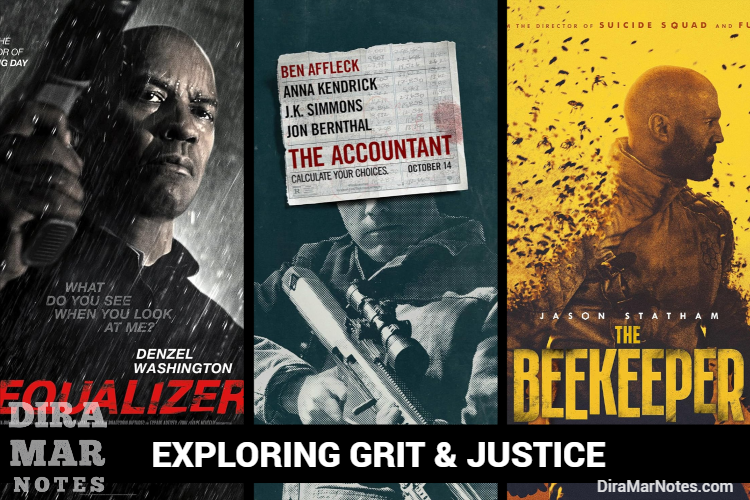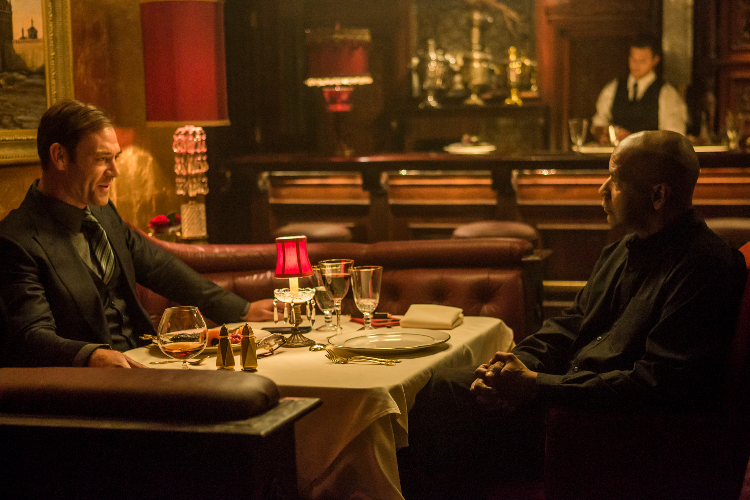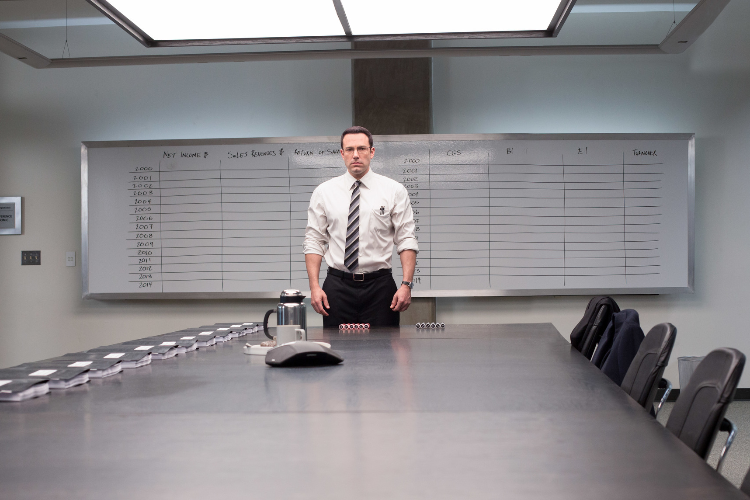
EXPLORING GRIT AND JUSTICE: THE ACCOUNTANT, THE EQUALIZER, AND THE BEEKEEPER
The world of cinema has often gravitated toward protagonists who blur the lines between hero and anti-hero, embodying justice with an edge of ruthlessness.
Films like The Accountant (starring Ben Affleck), The Equalizer (starring Denzel Washington), and The Beekeeper (starring Jason Statham) tap into this dynamic, presenting audiences with compelling narratives of vengeance, morality, and redemption. Let’s delve into each film’s essence, their storytelling highs and lows, and the themes that resonate throughout.
THE EQUALIZER (2014)
Denzel Washington stars as Robert McCall, a former black-ops operative seeking a quiet life in Boston. When he encounters Teri (Chloë Grace Moretz), a young woman exploited by a violent Russian mob, McCall’s sense of justice compels him to intervene, leading to a deadly confrontation with the criminal underworld.

HIGHS
- Washington’s commanding performance anchors the film, balancing quiet introspection with bursts of brutal efficiency.
- The pacing is taut, with a blend of tension-filled buildup and explosive action sequences.
- Antoine Fuqua’s direction emphasizes atmosphere, creating a gritty yet cinematic depiction of urban justice.
LOWS
- The villains lack depth, reducing the mob to one-dimensional antagonists.
- Some moments feel overly stylized, bordering on unrealistic (e.g., McCall’s meticulous timing during fights).
THEMES
At its core, The Equalizer delves deeply into themes of redemption and second chances, presenting Robert McCall as a man seeking to reconcile with his violent past by channeling his skills toward protecting the vulnerable. McCall’s journey is a poignant exploration of the human capacity to redefine oneself, as he transitions from a life shrouded in secrecy and violence to one devoted to acts of selflessness and justice.
Moral Responsibility
The film also examines the idea of moral responsibility—how those with the ability to make a difference have a duty to do so. McCall embodies this ethos, often placing himself in harm’s way to confront societal injustices, symbolizing a modern-day vigilante operating by a personal code of ethics.
Violence and exploitation
Additionally, the narrative touches on the cyclical nature of violence and exploitation, with the Russian mob representing a larger system of corruption and greed. Through his actions, McCall challenges the notion that such systems are unchangeable, offering a glimmer of hope that individuals, no matter how flawed, can effect meaningful change.
The oppressors and the oppressed
Lastly, The Equalizer underscores the power dynamics between oppressors and the oppressed. It paints a stark contrast between those who exploit power for selfish gain and those who wield it to protect and uplift others. McCall’s battle is not just physical but symbolic, highlighting the broader fight for dignity and justice in an often inequitable world.
The film leaves viewers contemplating the balance between morality and violence, challenging us to consider the lengths one might go to protect the vulnerable and correct wrongs in an unforgiving world.
My Rating: 7/10
THE ACCOUNTANT (2016)
Ben Affleck plays Christian Wolff, a highly skilled accountant with autism who has a secret life as a freelance forensic accountant for dangerous criminal organizations. The film unravels Christian’s double life as he helps Dana Cummings (Anna Kendrick), an accounting clerk, uncover embezzlement in a robotics firm, all while dodging law enforcement and lethal adversaries.

HIGHS
- The portrayal of Christian’s autism is handled with sensitivity and depth, adding a unique dimension to the protagonist.
- The action sequences are meticulously choreographed, showcasing Christian’s military precision and intellect.
- Affleck delivers a reserved yet powerful performance, making Christian’s internal struggles relatable.
LOWS
- The subplot involving J.K. Simmons and Cynthia Addai-Robinson’s characters feels underdeveloped.
- Some narrative twists, particularly the family backstory, feel forced and overly dramatic.
THEMES
The Accountant intricately weaves themes of identity, isolation, and justice, offering a multifaceted exploration of what it means to find purpose and connection in a world that often misunderstands or marginalizes difference. Christian Wolff’s character challenges societal perceptions of neurodiversity, showcasing how his autism—often framed as a limitation—becomes a wellspring of extraordinary skill, focus, and resilience. This narrative reframes the discussion around abilities, emphasizing that what makes someone different can also make them exceptional.
Isolation
The film also delves into the profound sense of isolation that comes with living a double life. Christian’s existence is defined by his need to remain hidden, both as a person on the autism spectrum navigating a neurotypical world and as a highly sought-after forensic accountant for criminal organizations. His interactions with Dana Cummings serve as a rare moment of human connection, illustrating the universal longing for understanding and companionship, even in the most unconventional circumstances.
Justice
Justice emerges as another central theme, with Christian’s moral compass guiding his actions despite the murky ethical terrain he inhabits. While he operates in a morally ambiguous world, his commitment to exposing corruption and protecting the innocent underscores a personal code of ethics. This juxtaposition between legality and morality prompts viewers to question traditional notions of right and wrong.
Identity
Finally, the narrative examines the impact of family and upbringing on one’s identity. Christian’s complex relationship with his father and brother shapes his worldview and survival skills, ultimately influencing his path as both an enforcer of justice and a protector of those who cannot defend themselves.
This blend of personal and societal themes makes The Accountant not just a thriller but a thought-provoking reflection on resilience, morality, and the human need for connection.
My Rating: 7/10
THE BEEKEEPER (2024)
In The Beekeeper, Jason Statham plays a former operative seeking revenge after the suicide of his close friend Eloise Parker played by Phylicia Rashad, who was scammed by an insidious company. As he investigates the organization, his violent pursuit of justice uncovers a larger conspiracy.

HIGHS
- Statham’s gritty performance adds authenticity to the role of a relentless avenger.
- The action is visceral and unflinching, maintaining the film’s intensity. While some scenes may appear fantastical, there’s a deep satisfaction in watching the bad guys lose, especially these kinds of thieves. I’m sure many of us know someone who has been scammed online, lost everything, and never saw justice served.
- The film’s exploration of modern exploitation—through scams and corporate greed—feels timely and relevant.
- The introduction of the Beekeepers, a clandestine organization that operates outside the chain of command battling corruption and greed to restore social balance.
LOWS
- The introduction of Eloise’s daughter is laced with modern-day prejudices. It doesn’t help that her character is annoying. To me, her storyline was not necessary. Her partner agent Wiley who had less screen time was more interesting than her.
- The pacing falters in the middle, with some scenes feeling repetitive.
- The story’s broader conspiracy is underexplored, leaving unanswered questions.
THEMES
The Beekeeper delves into themes of loyalty, vengeance, and societal exploitation, offering a poignant exploration of the devastating consequences of deceit and the extremes individuals may go to address perceived injustices.
The vulnerability of the elderly in the age of innovation
A standout aspect is its focus on the vulnerability of the elderly to cyberattacks, illustrating how their limited cybersecurity knowledge and trust make them prime targets. This often-overlooked issue is presented with urgency, shedding light on a growing concern. The whole sequence of Eloise talking to the scammers and the aftermath is a great illustration of one of the scenarios the elderly go through.
Justice and Class
The narrative also critiques the glaring inequities in justice, where the wealthy often escape severe consequences through fake apologies, community service agreements, threats, or bribery. In contrast, it underscores the universal principle that punishment should be consistent, regardless of one’s social or economic status. This disparity in accountability fuels cycles of vengeance, raising profound questions about fairness and the true meaning of justice.
The film’s exploration of justice, particularly its inequities, urges viewers to reflect on the societal structures that enable the powerful to evade accountability. It ultimately champions the resilience of those who fight for fairness, even when the odds are stacked against them.
My Rating: 6.5/10
SHARED THEMES AND LEGACY
Despite their distinct plots, these films share thematic undercurrents. Each protagonist operates outside conventional justice systems, using their unique skills to dismantle corrupt powers. They embody the duality of humanity: the capacity for great compassion alongside the potential for ruthless action.
Another common thread is the exploration of moral ambiguity. These heroes often employ extreme measures, prompting viewers to question the ethical boundaries of justice. Are their actions justified, or do they risk becoming as destructive as the forces they oppose?
Ultimately, I believe The Accountant, The Equalizer, and The Beekeeper succeed in delivering adrenaline-fueled entertainment while posing deeper questions about justice, redemption, and the human spirit. They remind us that even in the darkest corners of society, individuals are willing to fight for what is right—no matter the cost.
All images in this publication belong to the original creators and are used as references under fair use.



